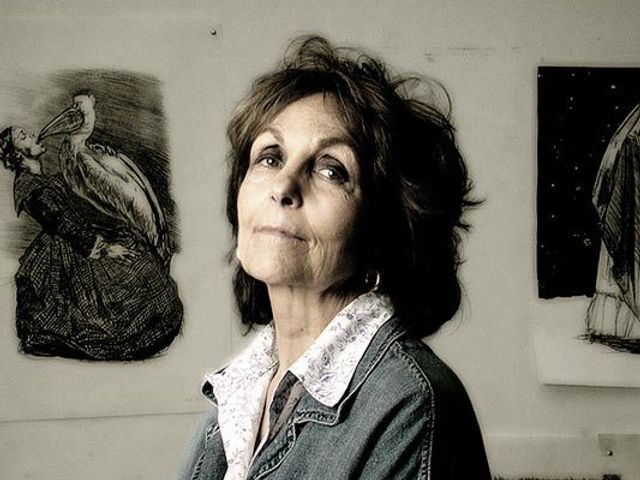Artist interview
Interview with Ruth Duckworth on her retrospective: “The older I get, the bigger my works and ideas become”
The ceramics grande dame thinks big
Interview with Tomma Abts, champion of abstraction
Abts’ small, deeply layered canvases exert a quiet power
Interview with Marina Abramovic on her reperformances at the Guggenheim: Back to the classics
The Yugoslav-born artist will re-enact famous performances from the 1970s this month
Interview with Jake Chapman: “Our hunger for Goya has not waned but our horizon has widened”
On the eve of the Chapmans’ first commercial show in three years, Jake Chapman talks to The Art Newspaper
“Our hunger for Goya has not waned but our horizon has widened”: Interview with Jake Chapman
On the eve of the Chapmans’ first commercial show in three years, Jake Chapman talks to The Art Newspaper
Interview with Cecily Brown on her UK success: “The act of looking is underrated”
After her achievements in New York, British painter Cecily Brown is having her first solo show in the UK
Interview with Malcolm Morley: Paintings about the act of painting
After 50 years, Morley is still fascinated by the potential of the medium and is not too proud to learn from a “watercolour holiday” on an English barge with amateur artists
Interview with Dennis Oppenheim on hid latest exhibition: “I could never stay with just one thing”
The veteran artist promises “truly radical” new work in his show at the Price Tower in Bartlesville, Oklahoma
Making space speak: An interview with Richard Wentworth
Richard Wentworth’s mid-career survey at Tate Liverpool is more of a remix than a retrospective
Interview with Tracey Emin: Art, life and autobiography
Tracey Emin’s new exhibition concentrates on her work as a filmmaker in which she usually takes the starring role
Interview with Susan Hiller: Her new work Clinic and the human quest for a visionary, mystical experience
American artist’s most recent piece is based on three years of research on the internet
Interview with Barry Flanagan on his fascination with bronze: A tradesman, not an artist
Flanagan chooses to depict hares rather than people to steer away from the dominance of the portrait
Interview with Mike Kelley on accumulating the uncanny in his new Tate Liverpool show
The Californian post-conceptualist plays the role of artist, curator and collector in his latest piece
Three degrees of separation: Interview with artist Mark Wallinger
Absence is as important as presence in Mark Wallinger’s new works on show
Is it a bird? A plane? No, just a G-string: Interview with artist E.V. Day
E.V. Day on thongs, Stealth Bombers and why her latest work stretches elasticity to its limit
Interview with James Rosenquist on his month in Manhattan
Four exhibitions devoted to the Pop pioneer open this November, including a retrospective at the Guggenheim
Paula Rego: prints of darkness
After 40 years, the Portuguese-born artist is still surprised by the images she creates
Interview with artist Richard Long: Still walking, after all these years
Long’s latest show is a collaboration with Indian tribal artist Jivya Soma Mashe
The art of allusion: Interview with Damian Loeb
Damian Loeb’s work relies on the viewer’s recognition of the visual sources that he quotes liberally
Francis Giacobetti interviews Francis Bacon: “I painted to be loved”
The last summing up, two months before he died, by the greatest Irish painter of the 20th century in an interview with the photographer Francis Giacobetti
Interview with John Wood and Paul Harrison: “I like the little one”
John Wood and Paul Harrison’s minimal, deadpan performances make complicated references to the art world of the past—with a dash of slapstick
Interview with Robert Ryman: Painting is for pleasure
Ryman has been painting white on white for more than 50 years. He talks about how his paintings work and which shade of white he uses
Interview with Robert Indiana on LOVE, Pop, words and more
Indiana has emerged from his Maine retreat to claim his rightful place alongside his more famous contemporaries
Interview with Richard Hamilton: Product Displacement
As major exhibitions of his work open in London and Barcelona, Hamilton explains his boredom with the London art scene, the lineage of his tables and his undying debt to Marcel Duchamp
Interview with Arman: "I do not want to end up in my own mausoleum”
The French artist on playing chess with Duchamp and collecting his own work
Interview with Michael Landy post-'Breakdown': New directions and championing of the urban weed
Last year Michael Landy meticulously catalogued and then destroyed all his material possessions. For his latest show he has photographed and etched the plants that grow spontaneously throughout the city
Interview with Steven Assael: Painting, the fullness of experience
The foremost figurative painter of his generation, talks about his passionate commitment to the art
Interview with Inka Essenhigh: "The world is big and time is short”
Essenhigh talks about her switch from enamel to oil, the difficulties of making pretty pictures and the ominous undertow of her paintings
Three young photographers who covered the war in Afghanistan talk about their experiences
'I am a photographer and I quite often get sent to photograph wars, I report on the human condition'
Interview with artist Thomas Joshua Cooper on his new show: At the edge, between lands and sea
Cooper is mapping out a metaphysical space with his images of oceans, forests, rocks and sky


